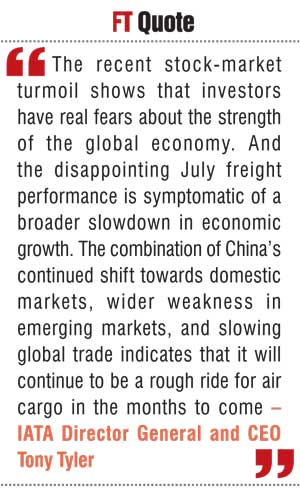Tuesday Feb 17, 2026
Tuesday Feb 17, 2026
Monday, 7 September 2015 00:00 - - {{hitsCtrl.values.hits}}

Geneva: The International Air Transport Association (IATA) released data for global air freight markets showing a fall in air cargo  demand in July compared to the same month last year. Air freight volumes measured in freight tonne kilometres (FTK) fell 0.6%, in line with weaker global economic growth.
demand in July compared to the same month last year. Air freight volumes measured in freight tonne kilometres (FTK) fell 0.6%, in line with weaker global economic growth.
The decline was broad-based across all regions with the exception of Africa and the Middle East. The most pronounced falls were in the Americas, where international FTK volumes were down more than 5% compared to July 2014.
“The recent stock-market turmoil shows that investors have real fears about the strength of the global economy. And the disappointing July freight performance is symptomatic of a broader slowdown in economic growth. The combination of China’s continued shift towards domestic markets, wider weakness in emerging markets, and slowing global trade indicates that it will continue to be a rough ride for air cargo in the months to come,” said IATA Director General and CEO Tony Tyler.
Regional analysis in detail
Asia-Pacific carriers saw a fall in FTKs of 1.9% in July compared to July 2014, and capacity expanded 5.3%. The region has experienced notable declines in imports and exports during 2015, with Chinese manufacturing particularly struggling.
European carriers reported a fall in demand in June of 1.5% compared to a year ago and capacity rose 3.9%. Central and Eastern Europe has had an especially tough few months, with trade in this region falling around 10% since the end of the first quarter.
North American airlines experienced a decline of 3.7% year-on-year and capacity grew 5.4%. Despite the subdued performance of the US economy in the first quarter, air freight benefited from a modal shift to air as a result of the West Coast ports strike in the US. This impact has faded and although economic performance likely improved in Q2, this does not seem to be driving stronger air freight demand.
Middle Eastern carriers saw the strongest growth with demand expanding by 10.8%, and capacity rising 18.3%. The reason for the slightly more subdued performance in July is due to the timing of Ramadan, which traditionally gives a boost to air freight. Ramadan started in June this year whereas it took place mostly in July in 2014.
Latin American airlines reported a fall in demand of 5.1% year-on-year, and capacity expanded 3.2%. Regional trade activity, Brazil and Argentina excepted, was very solid in the first half of 2015, but this did not feed through into stronger demand for air freight.
African carriers experienced growth in demand of 3.6%, and capacity rose by 11.4%. In contrast to Latin America, the strong regional trade performance in the region has underpinned solid air freight growth, despite the underperformance of the Nigerian and South African economies.